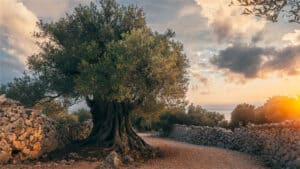Olive trees are an ancient evergreen that was domesticated between 6000 to 8000 years ago in the eastern Mediterranean. Today, olives are an important crop around the world, and the tree or its branches are still used symbolically because of its rich history. We’ll discuss the olive tree’s meaning, symbolism, and significance in a variety of religious and cultural contexts now.
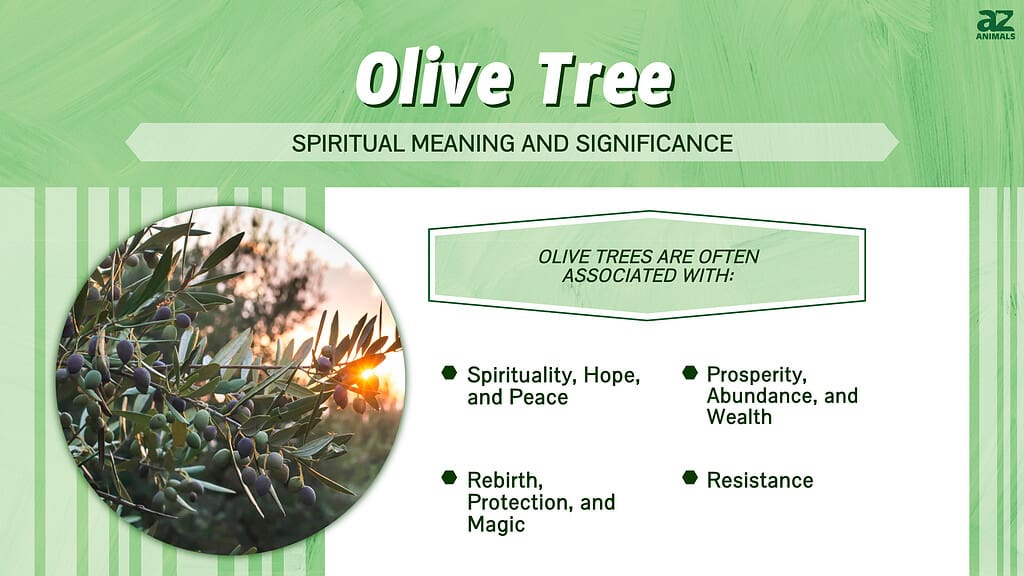
Peace: The Meaning of Olive Trees in Greek and Roman Mythology
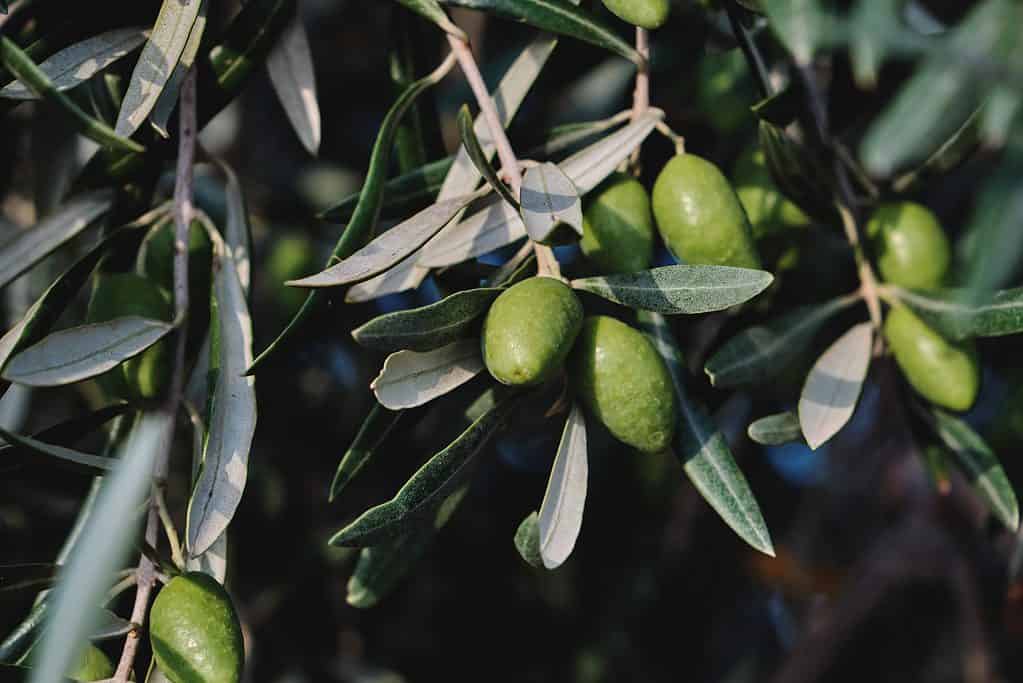
Poseidon planted the first olive tree as a symbol of peace in Greek mythology.
©jessicahyde/Shutterstock.com
The use of the olive tree as a symbol of peace is a common meaning interwoven throughout Greek and Roman mythology. When Zeus had Athena and Poseidon compete for control of Athens in Greek mythology, Athena won by putting the first olive tree on the Acropolis. This nonviolent act, and the gifting of a new valuable fruit, started the tradition wherein the olive tree symbolizes peace.
During the Pax Romana, which was a few hundred years of peace for the Roman Empire, olive branches were a symbol of peace. The military god Virtus was shown with olive branches which stood for his inner peace he maintained by being moral in his actions. The idea of the olive tree and its products as symbols of peace are expressed in many other tales from Greco-Roman history and mythology.
Rebirth, Protection, and Magic: Olive Tree Symbolism in Ancient Egypt
As the olive tree became a staple of Meditteranean life, it was exported to distant places like Ancient Egypt. There is evidence that the Berbers in North Africa already knew how to graft olive trees before the arrival of the Romans which shows that olive trees were important in the region long before the height of Ancient Egypt.
In Egyptian mythology, the goddess Isis showed humans how to grow olive trees and create olive oil. Since Isis is associated with magic, protection, and rebirth, the olive tree took on this significance. Since Ancient Egypt saw death as a moment of magical transformation, it’s not surprising that olive tree symbology appears in the tombs of Pharaohs.
The Eighteenth Dynasty Pharoah named Akhenaten is shown standing next to an olive tree. He is giving an olive branch to the god Aten on a wall carving in El-Amarna. Akhenaten’s son Tutankhamun is depicted wearing a crown of justice made out of olive branches in wall paintings. The crown of justice is common on mummies as it represents victory over death.
Prosperity, Abundance, and Wealth: The Significance of Olive Tree Symbolism in the Bible

A dove brought Noah an olive branch which showed that the Great Flood was ending.
©LittlePerfectStock/Shutterstock.com
The olive tree is seen throughout the Old Testament of the Bible. Noah received an olive branch from a dove which meant the Great Flood had ended. Since the dove was able to bring a terrestrial plant to Noah, it showed him hope that things were about to get better.
At other times, the Bible takes advantage of the olive tree’s ability to produce new shoots out of chopped stumps. There are also mentions of fruitfulness coming from otherwise arid and barren desert soils. Moments like these in the Bible speak to an overarching theme that sees the olive tree and its products as a symbol of abundance, wealth, and prosperity.
Spirituality, Hope, and Peace: The Torah and the Meaning of Olive Trees
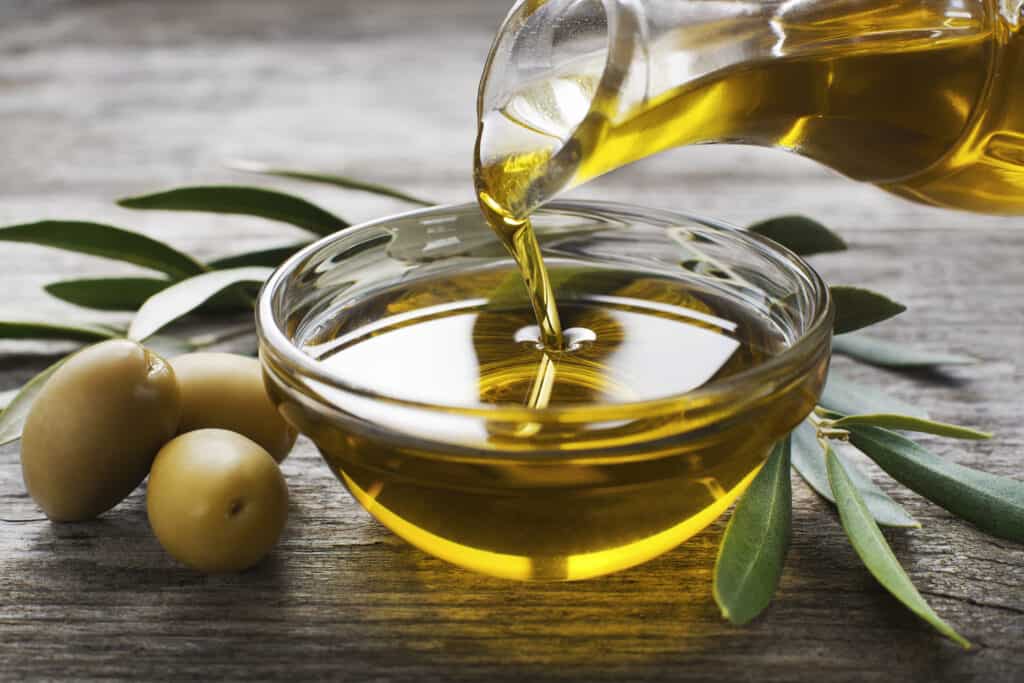
The word for olive tree in Hebrew translates to tree of oil.
©Dusan Zidar/Shutterstock.com
In Judaism, the olive tree and its parts symbolize peace and comfort. As with Christianity’s Bible, the Torah mentions the olive branch as a symbol of peace. The Great Flood story involving Noah and the dove is also a part of Judaism.
In Hebrew, the word meaning olive tree translates to tree of oil. This highlights the importance of olive oil to Judaism. Concerning Noah’s ark, the olive branch shows that the fruit that creates oil for light, food, and other purposes exists after the destruction of the Earth.
This means that in the wake of the destruction of an obsessively physical and sinful world, the essence of spirituality can still be pressed from what’s left of Noah’s reality. This fresh start can remain untainted by past mistakes if the expression of the non-physical remains a key component of daily living. In this way, the olive tree in the Torah represents peace, spirituality, and hope.
Rebirth and Faithfulness: The Meaning Behind Olive Tree Symbolism in Mormonism
The allegory of the olive tree in the Book of Mormon was originally written by the prophet Zenos. It is then recorded by Jacob. It’s a story about a man with a servant who visits a dying olive tree in his vineyard.
When they visit, they water the tree, they fertilize it, they aerate the soil, and they prune the tree. This nurses the tree back to life.
The idea of the olive tree being a symbol of peace is established before this allegory comes into play. This is because the Book of Mormon comes after the Bible. In this allegory, the tree is cared for to keep it fruitful which speaks toward the work a believer puts into keeping themselves and others faithful.
It takes work to cultivate and maintain peace in belief. This passage lets people know that whenever they start tending to their beliefs in earnest, rebirth and an increase in faith is possible.
Resistance: The Contemporary Significance of the Olive Tree in Palestine
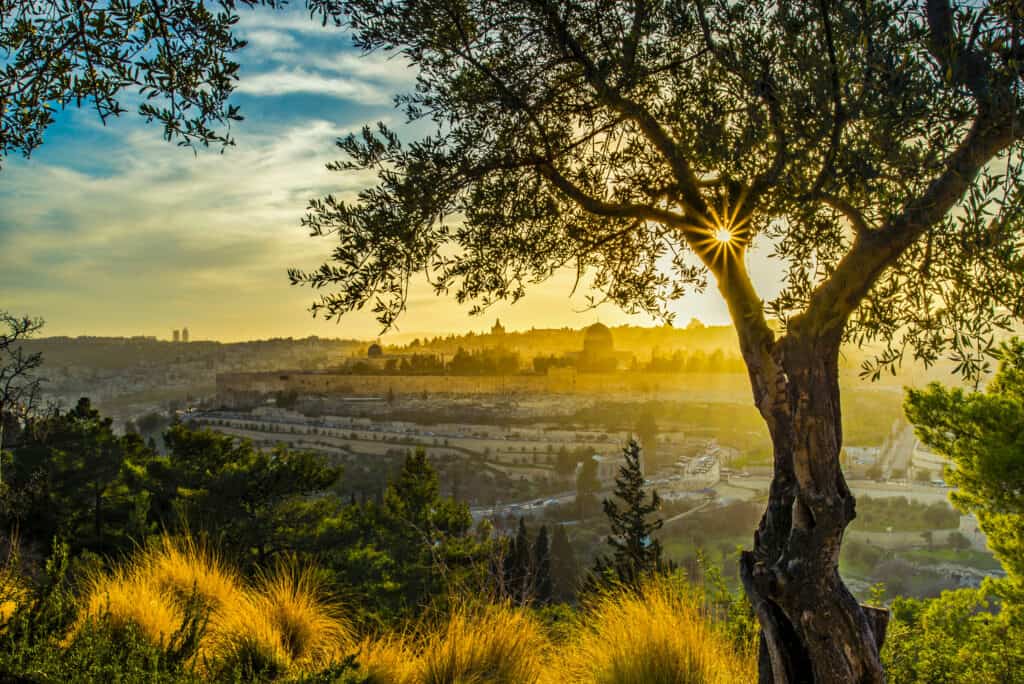
Olive trees are a point of contention between Israel and Palestine.
©John Theodor/Shutterstock.com
Olive trees have taken on a special importance in the relationship between Israel and Palestine. In Palestine, the olive tree symbolizes resistance to occupation. Many trees are growing in Palestinian territory that were planted hundreds of years before Israel became a nation.
In Palestine, olive trees are responsible for fueling up to 15 percent of its economy. However, accessing the appropriate permits needed to harvest and water these trees from Israeli authorities sometimes proves problematic. This means that Palestinian olive groves are not as productive as they could be.
Israel destroys olive trees in the Palestinian territories when necessary to further economic expansion. This happens despite the special importance of olive trees in Palestine. Since the Arab-Israeli War in 1967, over 800 thousand trees have been destroyed. Despite the negative impacts this has on Palestinian farmers, no governmental compensation is offered when these trees are removed.
The problem with destroying groves of olive trees is that freshly planted trees take around 2 decades to produce viable harvests. Because of these hurdles, the olive trees left in Palestine have taken on a unique symbolism. Since they’re hardy and old, they represent survival and resistance amidst struggle.
The photo featured at the top of this post is © iStock.com/Carter Wilson
Thank you for reading! Have some feedback for us? Contact the AZ Animals editorial team.




